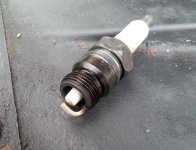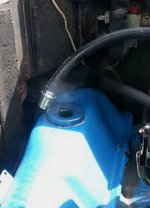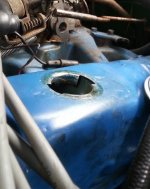Well, had my hot rod club friends do a compression check on the Ol' 73 and all 8 jugs came in at right around 125. PCV is brand new and so is the breather on opposite valve cover. New valve seals installed about 500 miles ago. Spark plugs are clean and look almost new. Idle is perfect. Nothing rough. But it is still sipping oil. I have narrowed it down to two possibilities (I think). Perhaps the small gaps in the rings have lined up allowing some oil to be drawn up into the chamber on the intake stroke or slightly worn valve guides. The receipts on the rebuild show new valve guides as well as everything else. The engine has about 1500 miles on it but the rebuild was done in 2010. So, my question is this: in lieu of pulling this engine and doing an exchange should I just keep an eye on the oil level and replace the filter at needed? At least the consumption has not increased. Right now I just don't have the cash to do an exchange.
Thanks for any suggestions. Donald.
Thanks for any suggestions. Donald.



